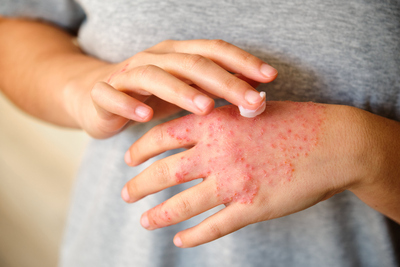What Causes Eczema to Flare-Up?

Eczema, also known as atopic dermatitis, is a chronic skin condition that affects millions of people worldwide. Characterized by dry, itchy and inflamed skin, eczema can be a source of significant discomfort and frustration for those who suffer from it. One of the most challenging aspects of managing eczema is dealing with flare-ups – periods when symptoms suddenly worsen. Understanding what causes eczema to flare up is crucial for effectively managing the condition and improving quality of life.
What Does Eczema Look Like?
Eczema (Atopic Dermatitis) is characterized by inflammation within the superficial skin layers. It manifests as itching, reddened scaly skin, excessively dry, cracked, or rough skin, small blisters and “weeping” skin. The latter develops when excessive fluid accumulates in the epidermis, a phenomenon called spongiosis or “spongy skin.” Inadequate treatment can result in skin thickening, hyperpigmentation and permanent scarring from vigorous scratching and frequent bacterial infections. It is important to seek specialized care early to reduce the likelihood of these conditions developing.
What is an Eczema Flare-Up?
An eczema flare-up occurs when symptoms of the condition intensify, leading to increased itching, redness and inflammation of the skin. These episodes can be triggered by various factors, both internal and external. Identifying and avoiding these triggers is key to preventing and managing eczema flare-ups.
How Long Does an Eczema Flare-up Last?
The duration of an eczema flare-up can vary significantly from person to person and depends on several factors, including the severity of the condition, the trigger and how quickly treatment is initiated. On average, a flare-up can last anywhere from a few days to several weeks. Prompt identification of triggers and early intervention can help reduce the duration and intensity of these episodes.
Common Eczema Triggers
Understanding the common triggers for eczema flare-ups is essential for effective management of the condition. Here are some of the most frequent causes.
1. Environmental Factors
Environmental triggers play a significant role in eczema flare-ups. These can include:
- Weather changes: Extreme temperatures, especially cold and dry conditions, can lead to skin dryness and trigger flare-ups.
- Humidity levels: Low humidity can dry out the skin, while high humidity can cause sweating, both of which can exacerbate eczema symptoms.
- Allergens: Dust mites, pollen, mold and pet dander are common environmental allergens that can trigger eczema flare-ups in sensitive individuals.
2. Irritants
Skin irritants are a major cause of eczema flare-ups. Common irritants include:
- Harsh soaps and detergents: Products containing fragrances, dyes, or other chemicals can strip the skin of its natural oils and cause irritation.
- Certain fabrics: Rough or synthetic materials like wool or polyester can irritate sensitive skin.
- Chemicals: Household cleaning products, solvents, and even some cosmetics can trigger flare-ups.
3. Stress
Emotional stress is a well-known trigger for eczema flare-ups. Stress can weaken the skin’s barrier function and increase inflammation, leading to worsening symptoms. Managing stress through relaxation techniques, exercise, and adequate sleep can help reduce the frequency and severity of flare-ups.
4. Hormonal Changes
Hormonal fluctuations, particularly in women, can influence eczema symptoms. Many women experience flare-ups during:
- Pregnancy
- Menstrual cycles
- Menopause
These hormonal changes can affect the skin’s moisture levels and immune response, potentially triggering or exacerbating eczema symptoms.
5. Infections
Additionally, the role of bacteria in eczema flares must be considered. The skin of most eczema patients is colonized by Staphylococcus aureus, the source of most skin infections in this condition. Once the skin’s integrity has been breached by the inflammation and spongiosis intrinsic to eczema, Staphylococcus aureus multiplies and spreads leading to further inflammation and eczema.
Initial treatment of a severely affected patient with evidence of bacterial infection (impetigo) includes oral and/or topical antibiotics. There are several antibiotics that can be used to treat most staphylococcus infections such as dicloxacillin, cephalosporins, and erythromycin. Topical mupirocin 2% ointment is often used alone or together with oral antibiotics. Oral antihistamines including Benadryl or Zyrtec attenuate itching.
6. Food Allergies and Sensitivities
While the link between diet and eczema is complex and varies from person to person, certain foods can trigger flare-ups in some individuals. In those who may be sensitive to foods, some common eczema diet triggers include:
- Dairy products
- Eggs
- Nuts
- Soy
- Wheat
- Citrus fruits
7. Hot Water and Excessive Bathing
While keeping the skin clean is important, excessive bathing or showering, especially with hot water, can strip the skin of its natural oils. This can lead to dryness and irritation, potentially triggering an eczema flare-up. Using lukewarm water and limiting bathing time can help prevent this issue.
8. Sweat
Physical activity and sweating can sometimes trigger eczema flare-ups. The salt in sweat can irritate the skin, and the moisture can lead to bacterial growth. However, this doesn’t mean you should avoid exercise – instead, try to shower promptly after working out and wear breathable, moisture-wicking clothing. However, be sure to not shower excessively such that it dries out the skin. If your goal is to just remove the sweat, sometimes a quick rinse with water followed by moisturizer should suffice.
9. Certain Medications
Some medications can potentially trigger or worsen eczema symptoms. These may include:
- Certain antibiotics
- Some cholesterol-lowering medications Some blood pressure medications
Treatment Options for Eczema Flare-Ups
Topical corticosteroids are the mainstay of eczema treatment. However, there are other nonsteroidal suppressors of skin inflammation such as the immunomodulator Elidel (pimecrolimus). In general, ointment formulas are more effective (and efficient) during initial treatment. Eucrisa ointment is a nonsteroidal topical immunomodulator. As a phosphodiesterase-4 inhibitor, it reduces the key inflammation that causes eczema. It is a relatively new player, approved for patients aged 2 years and older. Another new nonsteroidal topical agent is Opzelura which belongs to a class of medications called JAK inhibitors. These nonsteroidal formulas are usually combined with a topical cortisone ointment for their “steroid-sparing” effects. The risk of long-term side effects of prolonged corticosteroid therapy is very real in a recurring condition like eczema.
Dupixent is another systemic therapeutic option in the treatment of eczema. This “biologic” drug earned FDA approval in 2017. It is approved for adults and children with severe eczema and is a subcutaneous injection administered at regular intervals. Although it blocks the formation of certain inflammatory mediators in the skin (those implicated in eczema), it is not immunosuppressive and therefore not associated with the risks of most biologic therapies. Adbry is another biologic that works similarly and was more recently approved.
When to Seek Dermatology Eczema Flare-Up Treatment
It’s important to seek professional treatment when eczema flare-ups become severe, frequent or unmanageable with over-the-counter remedies. Signs that it’s time to consult a dermatology provider include:
- Persistent symptoms: If your eczema flare-up lasts for several weeks without improvement, even with self-care measures.
- Infection: Signs of infection, such as increased redness, warmth, pus or crusting, require immediate medical attention.
- Unbearable itching: When itching becomes so severe that it disrupts your daily activities or sleep, it may be time for stronger interventions.
- Worsening condition: If your eczema is spreading to new areas or worsening despite treatment, professional help can prevent further complications.
- Emotional or social impact: Eczema that affects your self-esteem, social interactions, or mental health can be addressed by a dermatology provider, who can provide additional therapies to improve your quality of life.
Eczema Flare-Up Treatment at Schweiger Dermatology Group
At Schweiger Dermatology Group, we understand how challenging and disruptive eczema can be. Take control of your skin health. To make an appointment, call 844-DERM-DOC or book online.
Reviewed by Dr. Jeremy Fenton.
